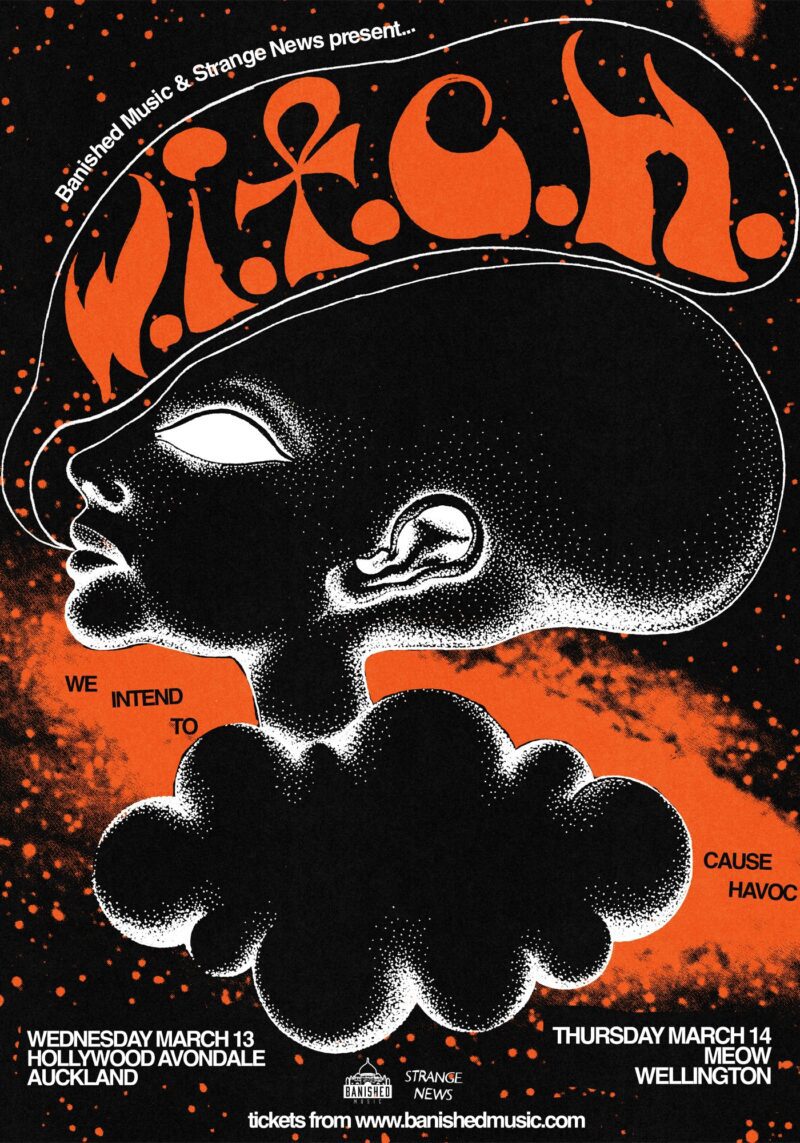WITCH
w/ The Spectre Collective
Meow, Wellington
Thursday March 14 2024
We Intend To Cause Havoc.
What a statement.
The acronym wasn’t part the band name originally, but I appreciate it all the same.
WITCH were a Zambian band in the 1970s. Their music – classed at “Zamrock” – was often psychedelic, groovy, and infectiously fun.
I can’t help but draw parallels between WITCH and Rodriguez. Rodriguez was an American musician who went through life of hardship, little realising that he was somehow a huge star overseas – notably in South Africa. The 2012 documentary Searching for Sugar Man drew attention to his music and revived his music career, resulting in a resurgence of interest and international tours.
Likewise, the 2019 documentary W.I.T.C.H about the band of the same name has revitalized the band, leading them to release their first album in 40 years, and travel the world.
While both WITCH and Rodriguez were sensations in Africa, WITCH were absolutely aware of their stardom. One of my favourite moments in the doco was when they read old newspaper articles about the band, detailing one occasion where fans were so desperate to attend a concert that they ripped the roof off the venue in order to enter. But a variety of factors led to the death of the band. The AIDs epidemic, a shift in interest from rock to disco, and economic and sociopolitical unrest in Zambia all contributed to its demise.
But they’re back now. Fronted by Jagari, with keyboardist Patrick Mwondela from WITCH’s disco era and some new younger band mates from both Zambia and around the world, WITCH have reformed, put out new record Zango, and are bringing Zamrock to the world again.
It’s a great tale. And who doesn’t love an underdog story? In the doco, Jagari compares himself to wine, saying that aging has only improved him. It was time to see if they band lived up to their legend.
Meow was packed. It was hot, and people were excited to be here.
The current iteration of WITCH includes nine members. As mentioned, Jagari and Mwondela are the two established players. They have two on their kinswomen – Hanna Tembo and Theresa Ng’ambi – on backing vocals and the rest of their bandmates come from as far afield as The Netherlands, Germany and America. I especially enjoyed the additional percussion that fleshed out the rhythm section with infectious beats.
Many of them wore wonderful bright clothing. I would have liked to see the entire band dressed to theme in a united front, if not just for the wonderful visual appeal. Tembo and Ng’ambi wore vibrant outfits with bold patterns and danced in unison with their big grins. Jagari, Mwondela and bass player Jacco Gardner all had colourful hats on, the first two with custom hats showing their band name emblazoned on the front, and Gardner’s must be a Zambian style – I’d seen it in the doco as well.
Jagari looked so pleased and at home onstage, clearly reveling in the chance to relive his glory days. the documentary had detailed some of his hardships – seeing many bandmates die young, being falsely accused of a crime that had him stripped of his teaching profession. He was doing hard labour – mining in search of precious gems for a living – when the documentary crew first found him. But now he had his second chance to share his talents and joy with fans from a stage, and this time he gets to travel the world doing it. His nickname is in comparison to The Rolling Stone’s Mick Jagger, and Jagari was known for his wild showmanship and marathon efforts during WITCH’s legendary sets back in their heyday. He may have toned down somewhat throughout the years, but his charm tonight was undeniable.
The thought did cross my mind that WITCH may feel ‘diluted’ from recruiting musicians from around the globe. Is it still authentic Zamrock if only half the band is from Zambia? But honestly, they sounded great, and they introduced many of the songs and shared that the inspirations came from Zambian daily life – phrases and experiences and people that they encounter in their culture. The funniest one was about how Jagari was almost rejected as a son-in-law by his wife’s family because musicians are not seen to have a respected profession in Zambia. How could he be trusted to provide for his family if he is a mere singer?
Another – “Malango” – was a song inspired by matriarchs who share wisdoms like how we can learn from bees. Tembo and Ng’ambi took over from Jagari and led the song, and you could see how their conversing at the beginning of the song was just like how things would be at home.
They drew from through their catalogue, but I’d say the handful of new songs from Zango offered a fresh extra oomph. Perhaps it is because these musicians were the ones that wrote and recorded the album, so they knew that material better? But the set was great throughout. As I mentioned, the venue was very full, and it was clear that some people were longtime fans, with many shouting out requests for their favourite songs between sings.
My favourite moments were when Jagari handed a cowbell out to members of the audience throughout one song, inviting them to contribute by playing how they see fit. Some tried to come up with interesting ostinatos during their turn, and one champion just laid into it like Will Ferrell in the infamous SNL “More Cowbell” skit. I found the crowd interaction so endearing, showing that the music is for everyone to enjoy and participate in. Jagari frequently gave high-fives to the front row attendees throughout the night, and made it very clear how grateful he was to his bandmates during the song “Introduction”. That mood permeated the night. Everyone was happy and thankful for the wonderful music that brings us together.
Joseph James


Hi Joseph. Re: Rodrigeuz. Im old enough to have listened to him pre teens when my elder brother played him on vinyl. Time moved on, then years later the whole “Where’s Rodrigeuz” deal begun. Thanks for article.